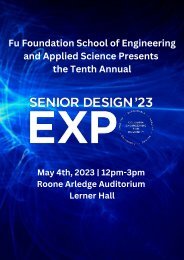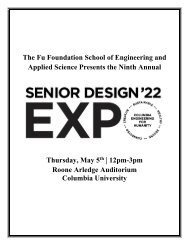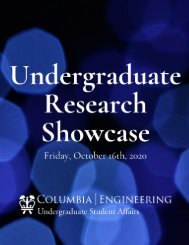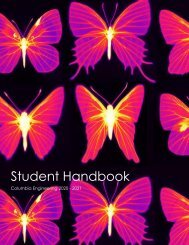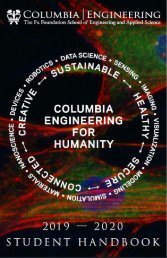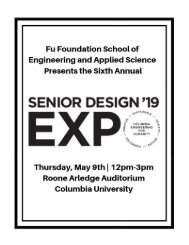Academic Assembly 2020
Engineering for Humanity: Mary C. Boyce, Dean of Columbia Engineering at The Fu Foundation School of Engineering and Applied Science, faculty and a fellow student will discuss the opportunities and challenges that you, as members of the Columbia Engineering Class of 2024, will have to make your own mark at Columbia and beyond. This event is required for all Columbia Engineering first-year students.
Engineering for Humanity: Mary C. Boyce, Dean of Columbia Engineering at The Fu Foundation School of Engineering and Applied Science, faculty and a fellow student will discuss the opportunities and challenges that you, as members of the Columbia Engineering Class of 2024, will have to make your own mark at Columbia and beyond. This event is required for all Columbia Engineering first-year students.
You also want an ePaper? Increase the reach of your titles
YUMPU automatically turns print PDFs into web optimized ePapers that Google loves.
New Student Orientation Program
Columbia Engineering
Impact the World!
Academic Assembly
August 31 st , 2020
Dean Mary Boyce
Dean of The Fu Foundation School of Engineering and Applied Science
Morris A. and Alma Schapiro Professor
Mary C. Boyce has served as Dean of Engineering at The Fu
Foundation School of Engineering and Applied Science at
Columbia University in the City of New York and also the Morris
A. and Alma Schapiro Professor of Engineering since 2013. Prior
to joining Columbia, Dean Boyce served on the faculty of the
Massachusetts Institute of Technology (MIT) for over 25 years,
leading the Mechanical Engineering Department from 2008 to
2013.
Dean Boyce leads the education and research mission of
Columbia Engineering with more than 220 faculty, 1600
undergraduate students, 2700 graduate students, and 100
postdoctoral fellows. She is committed to facilitating and
celebrating the creativity and innovation of students and faculty,
and enabling collaborations across the University. She has
launched a Columbia MakerSpace, created Ignition Grants to
support student physical and digital ventures, expanded
undergraduate research opportunities, initiated Columbia Design
Challenges, and established the Senior Design Expo. She also has
inaugurated the School’s participation in the Columbia Startup
Lab, and expanded entrepreneurship programming and the
Columbia Venture Competition in close partnership with the
University’s Columbia Entrepreneurship Initiative. She is a strong
advocate for enabling interdisciplinary research collaborations
across the School and the University, including extensively
transforming research spaces and expanding the faculty body in
cross-cutting fields as wide ranging as Data Science, Nano
Science, Advanced Materials and Devices, Sensing and Imaging,
Sustainability, and Engineering in Medicine. The education and
research mission of Columbia Engineering are guided by our
collective aspiration to bring engineering impact to human lives:
Columbia Engineering for Humanity.
Her own research focuses on advanced materials and mechanics,
particularly in the areas of multi-scale mechanics of polymers and
soft composites, both those that are man-made and those formed
naturally. She has been widely recognized for her scholarly
contributions to this field, including election as a fellow of the
American Society of Mechanical Engineer (ASME), the American
Academy of Arts and Sciences, and the National Academy of
Engineering. Most recently, Dean Boyce has been recognized
with the ASME 2020 Timoshenko Medal, considered the highest
scholarly recognition in the field of applied mechanics.
Dean Boyce earned her BS degree in engineering science and
mechanics from Virginia Tech, and her MS and PhD degrees in
mechanical engineering from MIT.
Vice Dean Barclay Morrison
Vice Dean of Undergraduate Programs
Professor of Biomedical Engineering
Barclay Morrison, Ph.D. is a professor of Biomedical
Engineering, director of the Neurotrauma and Repair
Laboratory, and serves as Vice Dean of Undergraduate
Programs for the Engineering School at Columbia University.
As vice dean, he is responsible for school-wide undergraduate
academic policy, co-chairing the Committee on Instruction
and serves as a primary liaison between the student body and
administration. He teaches Quantitative Physiology II, which
is a required course of the Biomedical Engineering major. His
research focus is on the biomechanics of traumatic brain injury
(TBI) at the tissue level to better prevent brain injuries, as well
as on the cellular pathways responsible for post-traumatic cell
dysfunction in the search for novel therapies. He has published
over 80 peer-reviewed scientific manuscripts, serves as a
council member and President of the International Research
Council on Biomechanics of Injury, is a board member of
Football Research Inc., and is associate editor for the Journal
of Neurotrauma. He received his B.S. in biomedical
engineering from Johns Hopkins University, his Ph.D. in
bioengineering from the University of Pennsylvania, and
continued his academic training as a post-doctoral fellow in the
Clinical Neurosciences department at Southampton
University, UK before joining the faculty of Columbia
University in 2003. Dr. Morrison is a past recipient of the
Rickard Skalak Best Paper Award given by the American
Society for Mechanical Engineers for a publication in the
Journal of Biomechanical Engineering and the John Paul Stapp
Award for the best paper in the Stapp Car Crash Journal.
Professor Matei Ciocarlie
Associate Professor of Mechanical Engineering
Matei Ciocarlie is an Associate Professor of Mechanical
Engineering at Columbia University. His main interest is in
robotics, looking to discover how artificial mechanisms can
interact with the world as skillfully as biological organisms.
Matei’s current work focuses on robot motor control,
mechanism and sensor design, planning and learning, all
aiming to demonstrate complex motor skills such as dexterous
manipulation. Matei completed his Ph.D. at Columbia
University in New York; his doctoral dissertation was the
winner of the 2010 Robotdalen Scientific Award. Before
joining the faculty at Columbia, he was a Research Scientist and
then Group Manager at Willow Garage, Inc., a privately funded
Silicon Valley robotics research lab, and then a Senior Research
Scientist at Google, Inc. In recognition of his work, Matei has
been awarded the Early Career Award by the IEEE Robotics
and Automation Society, a Young Investigator Award by the
Office of Naval Research, a CAREER Award by the National
Science Foundation, and a Sloan Research Fellowship by the
Alfred P. Sloan Foundation.
Ketsia Zinga
Biomedical Engineering ‘21
Ketsia is a senior majoring in Biomedical Engineering. She
spent the last three years tutoring local students with the
Tutoring & Learning Center and now works as an
undergraduate researcher in the Gang Labs where her current
project uses DNA origami nano-lattices to study ways of
mitigating X-ray damage to DNA. Ketsia is also involved in
Columbia's chapter of the National Society of Black Engineers,
the Questbridge-First Gen Low-Income Partnership, RUF
Christian ministry, as a Peer Connector with the Center for
Global Engagement, and as an undergrad rep on the BME
Committee for Diversity, Equity, and Inclusion. She has also
had gigs in the Glee Club, arranging music for the 24th Annual
Varsity Show, and as a producer for The Black Motherhood
Project film. Ketsia plans to pursue a PhD and career as a
university educator.
James Wang
Computer Science ‘22
James Wang is a junior at Columbia Engineering studying
computer science and serves as the 2019-2020 Columbia
Engineering Student Council Academic Affairs
Representative. On campus, James is also involved with
machine learning research, Columbia Organization of Rising
Entrepreneurs (CORE) and Global China Connection. In his
free time, he enjoys trying hiking, photography, and crafting
robots. Welcome to Columbia!
Code of Conduct
Engineering Student Council Academic Affairs
Representative, James Wang, will introduce the undergraduate
Honor Code and will lead the student body in reciting this
pledge.
Code of Honor
I affirm that I will not plagiarize, use unauthorized materials,
or give or receive illegitimate help on assignments, papers, or
examinations. I will also uphold equity and honesty in the
evaluation of my work and the work of others. I do so to
sustain a community built around this Code of Honor.
Pledge
We, the undergraduate students of Columbia University,
hereby pledge to value the integrity of our ideas and the ideas
of others by honestly presenting our work, respecting
authorship, and striving not simply for answers but for
understanding in the pursuit of our common scholastic goals.
In this way, we seek to build an academic community governed
by our collective efforts, diligence, and Code of Honor.
If you have not completed the Academic Integrity tutorial and signed the
pledge online, we encourage you to please do so before the start of classes.



